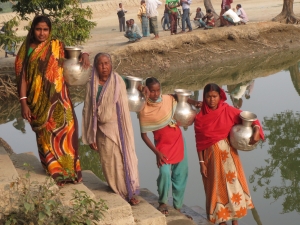Reducing the 'invisible work load' by access to safe drinking water
Location: Kultoli village, Munshiganj, Shyamnagar, Satkhira, Bangladesh. 2nd Jul 2015
According to Water.org, 180 million people are without access to safe drinking water in South, West and Central Asia. A survey conducted by Water.org from 45 different developing countries shows that women and children have a greater responsibility to collect water in 76% of the households.Millions of children and women in developing countries like Bangladesh spend a big proportion of their days collecting water, and this prohibits them access to crucial life chances. Coupled with poverty, the extra burden of fetching fresh water exacerbates factors like poor health, low educational attainment and a limited skill set.
A small grant project under Mangroves for the Future and implemented by local organization Nakshikantha Mohila Unnayan Sangstha tried to address this issue by rehabilitating freshwater sources in Kultoli village, Shyamnagar.
Kultoli village is at the border of the Sundarbans, and part of the people's livelihood is supported by the forest. Men traditionally harvest forest resources such as mudcrabs, honey, nipa leaves, or fish. Men are rarely involved in 'reproductive' responsibilities such as cooking, water collection, or childcare because these tasks are not 'real work' and fall under the women's domain. Women, in an effort to contribute income to the household, find time to collect shrimp larvae and crabs from nearby canals of the Sundarbans after completing their traditional tasks. Additionally, women are enlisted to clean private shrimp ponds of aquatic weeds; or are enlisted for work in seasonal labor around the area.
The Nakshikantha organization seeks to address this situation by improving gender equality through economic empowerment. They promote household based trades by training women. This is the first time they worked on a project involving fresh water scarcity, because in Kultoli, women do not have enough time to be involved in any trade at all. The hardship was extreme due to fresh water scarcity as well as health problems from waterborne diseases. Through the MFF small grant project, Nakshikantha re-excavated five ponds and provided 33 plastic tanks for storing rain water to increase access to safe water for consumption. In April 2014, four ponds have been successfully re-excavated and one pond was made into a reservoir that can store up to seven million litres of fresh water.
A year later in May 2015, at least 250 Kultoli village families get clean fresh water from the MFF re-excavated ponds, situated only 250 meters from their houses. Now, it only takes half an hour to collect water for the household.
The spill-over effects of the project's result have profound implications on the ‘invisible’ work carried out by women and children, which often goes unaccounted for as contributing to the productive sphere. In the case of Kultoli village, the amount of time it takes to go to the nearest clean water source has decreased. Villagers have more time for meaningful social activities that were being compromised on before, such as education, income generation, and caring for family members.
Women are happy about the change. One resident reported, "Having fresh water nearby gave me an extra two hours every day. With this time, I am now able to raise chickens, tend the garden, cook good meals for my family, and teach my children lessons for school. I also have less quarrels with my husband," she said with a smile.
However, having new freshwater sources nearby did not dramatically change the behavior of villagers towards water. The fresh water ponds are overseen by a village committee, led by the women living nearest the ponds. The committee has installed public announcement boards with messages about good practice related to clean water, such as boiling water before drinking; do's and don'ts when collecting water from the ponds; and precautions to keep poultry and livestock away. Today, the village is creating a collective fund from the contribution of water users, so the ponds can be maintained and kept in good state.
As a follow up to this project, Nakshikantha is planning for a community enterprise activity involving Kultoli women in new household-based trades.
Read more about the MFF Bangladesh project, Promoting accessibility to safe drinking water for the vulnerable community in Kultoli village

Fetching daily drinking water from far away ponds is a daily ... , Shyamnagar, Satkhira, Bangladesh © IUCN, 2014